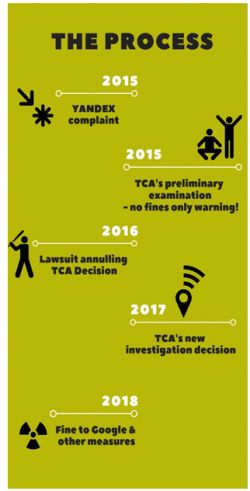Google was hit by another strike following the European Commission's €4.3 billion record fine. This time, the Turkish Competition Authority (TCA)—which previously resisted further investigating its mobile operating system practices in 2015—turned around and decided that Google had abused its dominant position in the licensable smart mobile operating systems market through its practices in the relevant market and other related markets such as the search and app store services markets. Accordingly, the TCA fined Google approx. €15 million and demanded that Google change its current relationship with the manufacturers.

Why did the TCA change its mind?
Yandex, as the provider of search and information services as well as mobile applications in Turkey and across Eurasia, brought a complaint in 2015 in relation to some of Google's agreements and compliance programs, which restrict mobile phone manufacturers from using alternative mobile operating systems and enforce the use of other Google products, such as the search and app services. The TCA, requesting certain amendments to Google's agreements with the manufacturers, resolved that launching an investigation was not necessary at the time.
However, the TCA had to re-evaluate its decision not to launch an investigation when the lawsuit brought against TCA's preliminary decision succeeded and the administrative court ordered a stay of execution of TCA's preliminary decision. Accordingly, the TCA had to re-visit its decision in 2017.
During this time, things became rather complicated for Google as it faced multiple investigations by various competition authorities around the world—including the European Commission. Following the Commission, the TCA decided that certain Google acts relating to mobile operating systems violated competition rules.
So, what's this hassle all about and, overall, how does the TCA evaluate Google's acts?
It is no surprise that Google makes the majority of its revenues from its flagship product – the search engine. A great proportion of Google's search engine related revenues consists of traffic achieved through its online (more specifically mobile) advertising products, such as Google AdWords, AdSense and Adx. Data acquired through such traffic works to Google's advantage, allowing it to use the data collected to leverage growth throughout the entire business and build consumer motivation. Moreover, Google comes forth as the (almost) only licensable smart mobile operating systems provider.
In its decision, the TCA further investigates Google's business model dependent on search based and non-search based online (and more specifically mobile) advertising products. The TCA evaluates that Google is enforcing its strength and advantage in the general internet search services market in its other mobile-based businesses by setting Google's search tools (i.e. Google Webview, Google Search, Google Chrome) as default tools, integrating them to the home screen of mobile products and requiring exclusive pre-instalment of its relevant apps on mobile devices.
Accordingly, in its decision, the TCA looks into Google's acts relating to mobile operating systems—more specifically in the licensable smart mobile operating systems market. In its analysis, the TCA notes that Google, which stands out as the first company to establish the Open Source Android (with the Android Open Source Project), benefits from the indirect network effects from the open source system—becoming the only player standing strong in the licensable smart mobile operating systems market (especially when compared to Microsoft's Windows Mobile). Accordingly, TCA evaluates that Google's practices in the licensable smart mobile operating systems market falls on the risky side.
What's so risky?
Within the scope of Google's practices related to licensable smart mobile operating systems, the TCA evaluates that the Open Source Android created by Google back in the day to welcome all players in the market does not meet up with today's consumer trends and commercial requirements. This is because Open Source Android used today fails to provide crucial on-demand features such as app stores and application programing interface. Accordingly, the manufacturers have to pick one of the following (the latter being an impractical option for reasons explained) in order to meet consumer demand and make money:

- Open Source Android + Google Play + Google Play Services (+ Google Mobile Services): Sign contracts with Google in order to use Open Source Android with Google Play app store and the Google Play Services enabling access to application programing interfaces. Accordingly, products must be developed in an Android compliant manner and must include some pre-installed apps under Google Mobile Services, allowing access to Google Chrome, Gmail, Google Calendar, Google Drive, Google Maps, Google Photos etc. Within this scope, Google signs three contracts with the manufacturers (ie. the Mobile Application Distribution Agreement, the Anti-Fragmentation Agreement and the Revenue Sharing Agreement).
- Use of Android Forks: Integrate Open Source Android code with non-Google app stores and apps subject to non-Google related license agreements. Under such alternative, it becomes impractical to download Google Play app store and/or Google Mobile Services after math if not pre-installed by the manufacturer.
In the decision, it is evaluated that this alternative is mainly applicable for platform restricting countries such as China—where Google is banned—and this is not applicable in Turkey. Indeed, even if the option was applicable in Turkey, it is argued that it would fail to work in an effective manner and meet consumer demand.
Due to the reasons explained, the TCA evaluates that the two options presented to the manufacturers are not interchangeable and may not be considered as substitutes to one another. Indeed, the second option is not even technically available to the manufacturers. Accordingly, the TCA evaluates that Google enforces the first alternative in its relationships with the manufacturer in Turkey.
Moreover, supported by the information provided by third parties such as mobile phone manufacturers, other product manufacturers and telecom operators, it is analyzed that Google appears to be the only platform providing app stores. Indeed, it is observed that the closest alternative to Google Play Store is Amazon's store. Accordingly, based on third-party submissions, it is evaluated that Amazon is not a strong competitor against Google because of the two following reasons:

- On the production side, the alternatives cannot match up to technical and safety requirements, and Google appears to seal the deal in the product manufacturing phase
- On the end user side, Google provides better consumer experience with integrated service and holds great consumer confidence.
- Overall, Google Play and Google search tools (prescribed as exclusive default search engine) are regarded to form an inseparable part of the licensable smart mobile operating system related contracts with manufacturers. Within this scope, an "all in" motto is foreseen by Google and manufacturers restricted from integrating services other search and app store services.
And the result is...
The TCA concludes that Google holds a dominant position in the licensable smart mobile operating systems market and evaluates that it abuses its dominant position in the relevant market by way of tying its search and app store services, imposing exclusivity practices on such and also preventing manufacturers from using alternative services to that end. Accordingly, whilst imposing a considerable amount of fine, the TCA demands Google change pre-instalment and exclusivity terms available in its manufacturer contracts and add an explicit statement allowing competing apps in addition to the Google app store.
The content of this article is intended to provide a general guide to the subject matter. Specialist advice should be sought about your specific circumstances.

